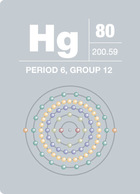
Liquid mercury is slightly toxic, while its vapor, compounds and salts are highly toxic and have been implicated as causing brain and liver damage when ingested, inhaled or contacted. The inhalation of mercury vapor can produce harmful effects on the nervous, digestive and immune systems, lungs and kidneys, and may be fatal. The inorganic salts of mercury are corrosive to the skin, eyes and gastrointestinal tract, and may induce kidney toxicity if ingested.
Once in the environment, mercury can be transformed by bacteria into methylmercury that can bioaccumulate in fish and shellfish. Large predatory fish are more likely to have high levels of mercury as a result of eating many smaller fish that have acquired mercury through ingestion of plankton.
